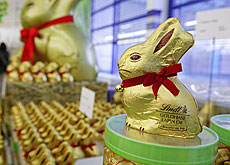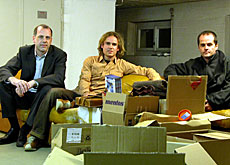Chocolate packaging comes under fire

The relaunch of a popular chocolate brand owned by Nestlé, the world's largest food company, is causing concern in environmentally conscious circles in Switzerland.
Under attack is the decision to package chocolate in polyethylene terephthalate (PET), the plastic resin commonly used to bottle drinks.
The Vevey-based food giant launched the new-look confectionery in February with a glitzy advertising campaign, splashed across Swiss hoardings, newspapers and televisions.
French star architect Jean Nouvel was commissioned to revitalise Cailler, one of the oldest names in the Swiss chocolate industry but not previously considered a premium brand.
The house of Cailler was built in 1819 and has been part of the Nestlé group since 1929. It generates 12 per cent of the total sales of Nestlé Switzerland.
PET hates
However, about a month after the relaunch a consumer association from French-speaking Switzerland, the FRC, published the results of a study into the amount of non-recyclable waste that the sexed-up chocolate would create.
It dropped a bombshell: the wrapping around 100g of Frigor chocolate, a popular Cailler brand, weighs 50g.
In addition, while PET drinks bottles are recyclable, the kind of PET used to make Cailler packaging is not and would have to be incinerated, resulting in increased emissions of carbon dioxide.
It added that the new packaging is five times more harmful to the environment than the old packaging.
Nestlé told swissinfo that the fact that the PET wrapping was not recyclable was not necessarily harmful to the environment.
“On the contrary, [this type of PET] is very much valued by incineration plants which recover energy from waste. [This PET] is used to produce electricity and distance heating,” spokesman Philippe Oertlé said.
But the Federal Environment Office told swissinfo that the use of PET in this case was “one step in the wrong direction”.
“Fifty grams of packaging instead of ten grams is not a catastrophe but it’s not in the direction of sustainable consumption. It’s going instead towards unnecessary packaging and hence an unnecessary burden to the environment,” said Hans-Peter Fahrni, head of waste management.
Consumer power
The final word, however, will go to Swiss consumers.
“I think more than half of the Swiss population looks at what they are buying and, as this type of chocolate is not normally sold in such an expensive packaging, I could imagine that people will abstain from buying these products,” said Fahrni, although he stressed it was hard to make a prognosis.
But what cannot be denied is the link with luxury that non-recyclable PET wrapping can have.
“It’s not an optimised packaging in the sense of sustainable packaging, but it is optimised for the purpose of giving a gift and of giving the impression of luxury,” Fahrni said.
Fahrni said that there was no system of contact between the government agency and companies when it came to new packaging. But broaching the issue with Nestlé could be an option.
“We could imagine making contact and asking them for further information or saying it’s not a good idea, but… it’s not so fashionable to think about sustainable packaging or consumption,” he added.
swissinfo, Faryal Mirza
40,000 tonnes of PET bottles are sold each year as drinks containers in Switzerland.
Of these, about three-quarters are recycled.
The total amount of non-recycled municipal solid waste is about 2.5 million tonnes a year, of which 10% is plastic.
PET stands for polyethylene terephthalate, a plastic resin and a form of polyester.
PET is a popular package for food and non-food products.
Manufacturers use PET plastic to package products because of its strength, thermo-stability and transparency. Customers choose PET because it is inexpensive, lightweight, resealable, shatter-resistant and recyclable.

In compliance with the JTI standards
More: SWI swissinfo.ch certified by the Journalism Trust Initiative











You can find an overview of ongoing debates with our journalists here . Please join us!
If you want to start a conversation about a topic raised in this article or want to report factual errors, email us at english@swissinfo.ch.